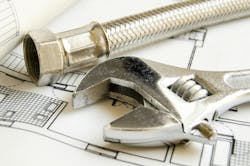IAPMO launches March4Water Month, recognizing plumbing systems
The International Association of Plumbing and Mechanical Officials (IAPMO) has announced March4Water Month, a new observance month to raise awareness in the U.S. about how safe and effective plumbing systems keep families and communities healthy and resilient.
As part of March4Water, each week in March will focus on four ways that water and plumbing impacts lives:
- How Plumbing Protects Public Health + Safety
- Effective Codes and Standards to Help Disaster Mitigation + Recovery
- Emerging Technologies for Water Sustainability + Efficiency
- Safe Clean Water for All: Assuring Affordability + Equity
“More than ever, our communities face new challenges related to water and wastewater systems,” said Dave Viola, IAPMO CEO and World Plumbing Council deputy chair. “Extreme weather events, sea level rise, and the aging infrastructure systems that govern our water supply increase the risks to our families without strong science-based codes and standards.”
The month of March already includes World Plumbing Day (March 11) and World Water Day (March 22), making it an appropriate time for plumbing appreciation.
IAPMO says that March4Water features a range of activities and resources designed to educate and engage the public, including:
- A Plumbing Resiliency Toolkit for Communities that review best practices for plumbing codes based on local water need. The IAPMO Group supports ease of implementation for advanced water technologies by geographic region with detailed customization options.
- Five free webinars drawn from the vast technical training library IAPMO supplies to organizations and individuals to train, certify and license the workforce needed to build and maintain a modern hygiene infrastructure.
- A social media toolkit to advance awareness and understanding.
“Water systems and plumbing standards are largely hometown issues because there are so many variables that impact different regions,” said Tom Palkon, IAPMO executive vice president and chief technical services officer. “March4Water Month is about raising awareness at the grassroots level about how best to address local water policy and plumbing standards to keep people safe while making the best use of resources and promoting affordable homes and buildings.”
